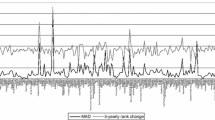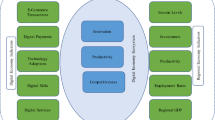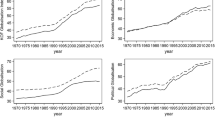Abstract
Globalisation has become a key concept in the social sciences to understand the accelerating changes occurred in modern societies during recent decades. As a consequence, measuring the influence of globalisation on the economic, social and political aspects of nations has been a requirement. There are many indices at present to calculate the extent of globalisation reached by each country. However, most of the methods used to build those indices suffer certain methodological limitations that hinder the wider dissemination and usefulness of their results. As an alternative, in this paper, we propose a methodology for ordinal ranking of countries associated with their globalisation level, which gives us an easier and more useful information about the different levels where countries are regarding to this criteria. Among Computational Intelligence techniques, Artificial Neural Networks (ANNs) have become dominant modelling paradigm. We have built a novel non-linear ordinal classifier by combining the Proportional Odd Models (POM) with ANNs that is able to classify countries according to their level of globalisation in six classes, which range from hyperglobalised countries to countries that remain outside the process of globalisation. The results could not be more encouraging. Our experiments yield robust results and show better outcomes than alternative linear and non-linear ordinal classifiers, which raises the possibility of developing a model of classification that might overcome some of the limitations of the indices currently employed to measure globalisation.

Similar content being viewed by others
Notes
See http://globalisation.kof.ethz.ch/papers/ for an extensive list of articles using the index.
It must be noted that, sometimes, rating techniques have been accused to dull the provocative effect of ranking (Roodman 2008). However, after 10 years of development of a dozen indices of globalisation and no one finding real dissemination at social or political levels, it could be the right moment to try a new focus. Classifications techniques can also provide clear and swift information to policy and decision makers, helping countries as well in the search for strategic allies in the international arena.
References
Baccianella, S., Esuli, A., Sebastiani, F.: Evaluation measures for ordinal regression. In: Proceedings of the Ninth International Conference on Intelligent Systems Design and Applications (ISDA 09), Pisa, Italy (2009)
Beck, U.: The cosmopolitan perspective: sociology of the second age of modernity. Brit. J. Sociol. 51(1), 79–105 (2000)
Bednárová, P., Kocourek, A., Laboutková, S.: An analytic study on internal linkages between human development and globalization. J. Mod. Acc. Audit. 8(12), 1823–1837 (2012)
Bergh, A., Karlsson, M.: Government size and growth: accounting for economic freedom and globalization. Public Choice 142(1–2), 195–213 (2010)
Bergh, A., Nilsson, T.: Good for living? On the relationship between globalization and life expectancy. World Dev. 38(9), 1191–1203 (2010)
Bishop, C.M.: Improving the generalization properties of radial basis function neural networks. Neural Comput. 8, 579–581 (1991)
Callejón, A.M., Casado, A.M., Fernández, M.A., Peláez, J.I.: A system of insolvency prediction for industrial companies using a financial alternative model with neural networks. Int. J. Comput. Intell. Syst. 6(1), 29–37 (2013)
Caselli, M.: On the Nature of Globalization and Its Measurement. Some Notes on the A.T. Kearney/Foreign Policy Magazine Globalization Index and the CSGR Globalisation Index. Working Papers O-2006/3. UNU-CRIS, Brugge (2006)
Caselli, M.: Measuring what? Notes on some globalization indices. Globalizations 5(3), 383–404 (2008)
Caselli, M.: Globalization indices based on states: a comparison and some criticisms. In: Caselli, M. (ed.) Trying to Measure Globalization: Experiences, Critical Issues and Perspectives, pp. 97–120. Springer, New York (2012)
Castro, L.N., Hruschka, E.R., Campello, R.J.G.B.: An evolutionary clustering technique with local search to design rbf neural network classifiers. In: Proceedings of the IEEE International Joint Conference on Neural Networks, pp. 2083–2088 (2004)
Chaudhuri, A., De, K.: Fuzzy support vector machine for bankruptcy prediction. Appl. Soft Comput. 11(2), 2472–2486 (2008)
Chauvin, Y., Rumelhart, D.E.: Backpropagation: Theory, Architectures, and Applications. Lawrence Erlbaum Associates, Mahwah (1995)
Chen, J.H., Fang, Y.P.: A study on the modified components of Asian currency unit: an application of the artificial neural network. Qual. Quant. 45(2), 329–347 (2011)
Chu, W., Ghahramani, Z.: Gaussian processes for ordinal regression. J. Mach. Learn. Res. 6, 1019–1041 (2005)
Chu, W., Keerthi, S.S.: Support vector ordinal regression. Neural Comput. 19(3), 792–815 (2007)
Cohen, S., Intrator, N.: A hybrid projection-based and radial basis function architecture: initial values and global optimisation. Pattern Anal. Appl. 5, 113–120 (2002)
Cortes, C., Vapnik, V.: Support-vector networks. Mach. Learn. 20(3), 273–297 (1995)
Donoho, D.: Projection-based approximation and a duality with kernel methods. Ann. Stat. 5, 58–106 (1989)
Dorado-Moreno, M., Gutiérrez, P.A., Hervás-Martínez, C.: Ordinal classification using hybrid artificial neural networks with projection and kernel basis functions. In: 7th International Conference on Hybrid Artificial Intelligence Systems (HAIS2012), pp. 319–330 (2012)
Dreher, A.: Does globalization affect growth? Evidence from a new index of globalisation. Appl. Econ. 38(10), 1091–1110 (2006)
Dreher, A., Gaston, N.: Has globalization increased inequality. Rev. Int. Econ. 16(3), 516–536 (2008)
Dreher, A., Sturmand, J.E., Ursprung, H.W.: The impact of globalization on the composition of government expenditures: evidence from panel data. Public Choice 134(3–4), 263–292 (2008)
Dreher, A., Gaston, N., Martens, P.: Measuring Globalisation: Gauging Its Consequences. Springer, New York (2008)
Easterly, W.: Channels from globalization to inequality: productivity world versus factor world. In: Collins, S., Graham, C. (eds.) Brookings Trade Forum 2004: Globalization, Poverty, and Inequality, pp. 39–81. The Brookins Institution, Washington (2004)
Ebenthal, S.: Messung von Globalisierung in Entwicklungslndern: Zur Analyse der Globalisierung mit Globalisierungsindizes. Berichte aus dem Weltwirtschaftlichen Colloquium der Universitt Bremen, 105. IWIM, Bremen (2007)
Fletcher, R., Reeves, C.M.: Function minimization by conjugate gradients. Comput. J. 7, 149–154 (1964)
Friedman, T.L.: The Lexus and the Olive Tree: Understanding Globalization. MacMillan, New York (2000)
Giddens, A.: The Consequences of Modernity. Cambridge Polity Press, Cambridge (1990)
Guo, H., Diao, F., Zhu, K., Li, J., Xing, Y.: Soft computing system for bank performance prediction. A new method of soft computing to estimate the economic contribution rate of education in China. Appl. Soft Comput. 8(1), 499–506 (2008)
Gutiérrez, P.A., Hervás-Martínez, C., Carbonero-Ruz, M., Fernandez, J.C.: Combined projection and kernel basis functions for classification in evolutionary neural networks. Neurocomputing 27(13–15), 2731–2742 (2009)
He, Y., Liao, N., Liu, H., Zhong, Y.: A new method of soft computing to estimate the contribution rate of S&T progress on economic growth. Appl. Soft Comput. 12(6), 1801–1809 (2008)
Held, D.: Global Transformations: Politics, Economics and Culture. Stanford University Press, Stanford (1999)
Heshmati, A.: Measurement of a multidimensional index of globalization. Glob. Econ. J. 6(2), 1–28 (2006)
Ishibuchi, H., Yoshida, T., Murata, T.: Balance between genetic search and local search in hybrid evolutionary multi-criterion optimization algorithms. IEEE Trans. Evol. Comput. 7(2), 204–223 (2003)
Kearney, A.T.: The carnegie endowment for international peace. Globalizations last hurrah? Foreign Policy January–February, 38–51 (2002)
Keohane, R.O., Nye, J.S.: Introduction. In: Nye, J., Donahue, J.D. (eds.) Governance in a Globalizing World, pp. 1–44. Brookins Institution Press, Washington (2000)
Koza, J.R., Rice, J.P.: Genetic generation of both the weights and architecture for a neural network. In: Proceedings of International Joint Conference on Neural Networks, vol. 2, pp. 397–404. IEEE Press, Seattle (1991)
Lee, S.H., Hou, C.L.: An art-based construction of RBF networks. IEEE Trans. Neural Netw. 13(6), 1308–1321 (2002)
Li, L., Lin, H.T.: Ordinal regression by extended binary classification. Adv. Neural Inf. Process. Syst. 19, 865–872 (2007)
Lickert, R.: A technique for the measurement of attitudes. Arch. Psychol. 22(140), 1–55 (1932)
Lin, W.B.: Antecedents of employee involvement with the comparative model. Qual. Quant. 44(3), 459–482 (2010)
Lin, W.B.: Factors affecting high-involvement product purchasing behavior. Qual. Quant. 47(6), 3113–3133 (2013)
Lind, N.: A calibrated index of human development. Soc. Indicators Res. 98(2), 301–319 (2010)
Lippmann, R.P.: Pattern classification using neural networks. IEEE Trans. Neural Netw. 27, 47–64 (1989)
Lombaerde, P.D., Iapadre, P.L.: The world is not flat. World Econ. 9(4), 159–180 (2008)
Martens, P., Zywietz, D.: Rethinking globalisation: a modified globalisation index. J. Int. Dev. 18, 331–350 (2006)
Martens, P., Dreher, A., Gaston, N.: Globalisation, the global village and the civil society. Futures 42(6), 574–582 (2010)
Martínez-Estudillo, A.C., Martínez-Estudillo, F.J., Hervás-Martínez, C., García, N.: Evolutionary product unit based neural networks for regression. Neural Netw. 19(4), 477–486 (2006)
McGillivray, M.: Commitment to Development Index: A Critical Appraisal. AusAid, Canberra (2003)
Mishra, S.K.: A comparative study of trends in globalization using different synthetic indicators. MPRA Paper No. 38028. MPRA, Munchen (2012)
Nikitin, P.V., Elliott, J.E.: Freedom and the market (an analysis of the anti-globalisation movement from the perspective of the theoretical foundation of the evaluation of the dynamics of capitalism by Palanyi, Hayek and Keynes). Forum Soc. Econ. 30(1), 1–16 (2000)
ORourke, K.H., Williamson, J.G.: Globalization and History: The Evolution of a Nineteenth Century Atlantic Economy. The MIT Press, Boston (1999)
Pérez-Ortiz, M., Cruz-Ramírez, M., Ayllon-Terán, M.D., Heaton, N., Ciria, R., Hervás-Martínez, C.: An organ allocation system for liver transplantation based on ordinal regression. Appl. Soft Comput. 7(2), 275–284 (2013)
Potrafke, N.: Did globalization restrict partisan politics? An empirical evaluation of social expenditures in a panel of oecd countries. Public Choice 140(1–2), 105–124 (2009)
Potrafke, N.: Labor market deregulation and globalization: empirical evidence from OECD countries. Rev. World Econ. 146(3), 545–571 (2010)
Potrafke, N.: Globalization and labor market institutions: international empirical evidence. J. Comp. Econ (2013). doi:10.1109/TSMCB.2005.860138
Ravi, V., Kurniawan, H., Thai, P.N.K., Kumar, P.R.: Soft computing system for bank performance prediction. Appl. Soft Comput. 8(1), 305–315 (2008)
Robertson, R.: Globalization: Social Theory and Global Culture. Sage, London (1992)
Robertson, R.: The Three Waves of Globalization: A History of a Developing Global Consciousness. Zed Books Ltd., London (2003)
Roodman, D.: A tale of two indices: the commitment to development index as a model for the Humanitarian response index. In: Associates, D.A.R. (ed.) The Humanitarian Response Index 2008: Donor Accountability in Humanitarian Action, pp. 65–74. Palgrave, Washington (2008)
Samimi, P., Lim, G.C., Buang, A.: Globalization measurement: notes on common globalization indexes. J. Knowl. Manag. Econ. Inf. Technol. 1(7), 1–20 (2011)
Sánchez-Monedero, J., Campoy-Muñoz, P., Gutiérrez, P., Hervás-Martínez, C.: A guided data projection technique for classification ofsovereign ratings: the case of European Union 27. Appl. Soft Comput. 22, 339–350 (2014)
Schmitt, M.: On the complexity of computing and learning with multiplicative neural networks. Neural Comput. 14, 241–301 (2001)
Scholte, J.: Globalization—A Critical Introduction. MacMillan Press, London (2000)
Sianes, A., Dorado-Moreno, M., Hervás-Martínez, C.: Rating the rich: an ordinal classification to determine which rich countries are helping poorer ones the most. Soc. Indicators Res. 116(1), 47–65 (2013)
Soysa, I.D., Vadlamannati, K.C.: Does being bound together suffocate, or liberate? The effects of economic, social, and political globalization on human rights, 1981–2005. Kyklos 64(1), 20–53 (2011)
Spich, R.: Globalization folklore: problems of myth and ideology in the discourse on globalization. J. Organ. Change Manag. 8(4), 6–29 (1995)
Stapleton, L.M., Garrod, G.D.: Keeping things simple: why the human development index should not diverge from its equal weights assumption. Soc. Indicators Res. 84(2), 179–188 (2007)
Tallón-Ballesteros, A.J., Hervás-Martínez, C.: A two-stage algorithm in evolutionary product unit neural networks for classification. Expert Syst. Appl. 38(1), 743–754 (2011)
Tsai, M.C.: Does globalization affect human well-being? Soc. Indicators Res. 81(1), 103–126 (2007)
Wang, Y.H.: Using neural network to forecast stock index option price: a new hybrid garch approach. Qual. Quant. 43(5), 833–843 (2009)
Wolf, M.: Will the nation-state survive globalization? Foreign Affairs 80(1), 178–190 (2001)
Yao, X., Liu, Y.: A new evolutionary system for evolving artificial neural networks. IEEE Trans. Neural Netw. 8(3), 694–713 (1997)
Acknowledgments
This work has been partially subsidised by the TIN2011-22794 project of the Spanish Ministry of Economy and Competitiveness (MINECO), FEDER funds and the P2011-TIC-7508 project of the “Junta de Andalucía” (Spain).
Author information
Authors and Affiliations
Corresponding author
Appendix
Appendix
See Table 7.
Rights and permissions
About this article
Cite this article
Dorado-Moreno, M., Sianes, A. & Hervás-Martínez, C. From outside to hyper-globalisation: an Artificial Neural Network ordinal classifier applied to measure the extent of globalisation. Qual Quant 50, 549–576 (2016). https://doi.org/10.1007/s11135-015-0163-7
Published:
Issue Date:
DOI: https://doi.org/10.1007/s11135-015-0163-7





